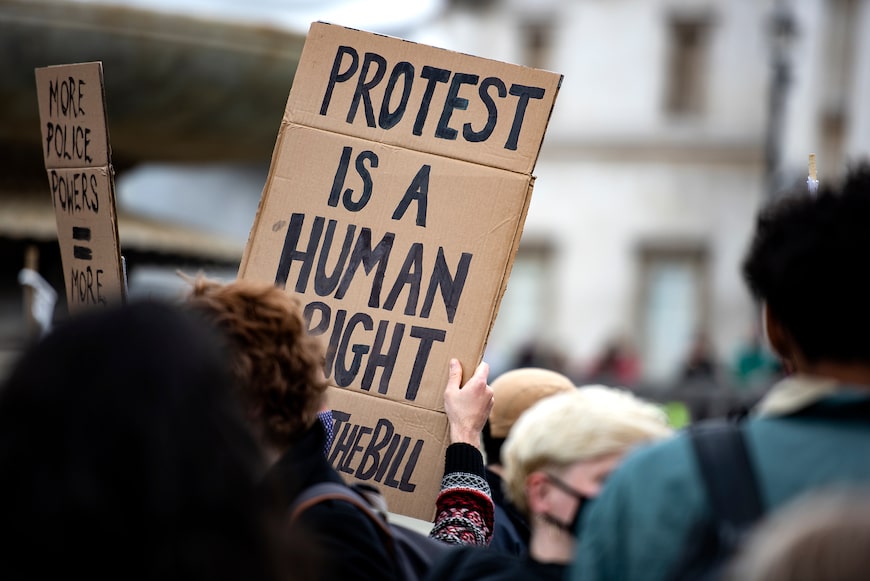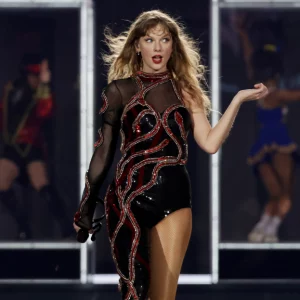In the United Kingdom, the right to protest is under direct assault by the Conservative government. However, some of their efforts were recently dealt a significant—but limited—blow by a body of unelected nobles and aristocrats.
On February 7, the House of Lords handed Prime Minister Rishi Sunak’s government a substantial legislative defeat by rejecting several key provisions of the “Public Order Bill” pushed by the Prime Minister and many members of his Conservative Party. Designed to crack down on “disruptive” protests, four especially controversial components of the bill (which only applies to England and Wales, not Scotland and Northern Ireland) were voted down by the Lords, a body where the Conservatives have control as in the House of Commons. Given that the rejected components were not added to the bill until after it was passed by the House of Commons and sent to the Lords to review, the rules governing so-called “parliamentary ping-pong” dictate that they cannot be added back to the bill once it returns to the Commons for final approval.
The “Public Order Bill” has courted immense controversy within the U.K. and beyond since being introduced in May of last year. The legislation was derived primarily from portions of the 2022 Police, Crime, Sentencing, and Courts Act that were likewise rejected by the Lords last year. Government officials have sold the bill as a necessary step to expand the power of police in the midst of increasingly frequent protests, particularly by environmental groups, seen to be detrimental to public order and safety. Activists from groups such as Just Stop Oil UK, Insulate Britain, and Extinction Rebellion participated in highly-publicized protests over the past couple of years and adopted extreme strategies such as gluing themselves to highways, chaining themselves to buildings, and digging tunnels to block infrastructure projects. Under then-Prime Minister Boris Johnson, the Tory government first introduced the bill to further criminalize these acts and hand more power to police to prevent protestors from engaging in such acts in the first place—though the Police, Crime, Sentencing, and Courts Act had already accomplished some of this.
Days prior to the end of Liz Truss’s brief tenure as Prime Minister in October 2022, the bill passed by a vote of 283 to 234, with its support almost exclusively confined to Tory MPs. But in January of this year, PM Rishi Sunak introduced several amendments to the bill to further expand police powers of detainment, search and seizure, and protest prevention.
Of the amendments proposed by the Prime Minister, the Lords rejected the most significant pieces, including:
- Rejecting a provision that would have allowed police to shut down protests before they caused any disruption so long as they could show they had reason to believe disruption would at some point occur.
- Rejecting a provision that would have allowed for courts, at the recommendation of police, to issue Serious Disruption Prevention Orders (SDPOs) which would prevent individuals, who had not been convicted of any crime, from engaging in, aiding, or being near protest activities. People subject to SDPOs could be required to wear electronic GPS tags and would be subject to jail time if they violated the order.
- Rejecting a provision that would have allowed police officers to stop and search people near protests without any suspicion.
- The Lords also amended the bill, against the wishes of the government, to include protections for journalists’ ability to observe protests and police actions.
But while many of the bill’s most restrictive pieces were removed, it still contains several concerning provisions, including:
- The bill still criminalizes the protest acts of ‘locking on’ and tunneling—the practices of attaching oneself to objects and literally digging tunnels so as to obstruct or disrupt public business.
- New offenses have been introduced to criminalize any activities that interfere with “key national infrastructure” or “major transport works” such as airports, railways, or “oil and gas infrastructure.”
- Courts may still issue SPDOs and require GPS tracking for individuals convicted of protest-related crimes.
- The definition of “suspicion” that can justify police searches has been expanded to include the suspicion that a person may be “carrying an object that they intend to use in connection with a protest-related offense.”
At first glance, it may seem perplexing as to why an ostensibly democratic nation would be so blatantly attempting to crack down on the freedom of expression and protest. But a deeper analysis of the current politics of the United Kingdom renders this development fairly unsurprising.
For one, this is actually a politically popular issue for the Tories. The aforementioned protests staged by environmental groups over the past few years are incredibly unpopular with the British public. A November 2022 poll found that 62% of Britons were opposed to the tactics of Just Stop Oil, one of the most extreme groups that engaged in various acts of vandalism and dangerous stunts late last year. Though this may be an extreme case, the Conservatives have seized on general public distaste for disruptive protests, and have pushed this bill in order to be seen as serving the public’s interest.
That same poll from November of last year found that large majorities of Britons were in favor of the Public Order Bill’s provisions, from criminalizing certain protest acts to expanding SDPOs, and increasing police stop and search powers. The Conservatives are currently in desperate need of political victories, as the party has been battered by scandals and embarrassments over the past year or so. Their poll numbers have suffered through the revelations about Boris Johnson’s parties during the COVID lockdown, Liz Truss serving the shortest tenure of any British prime minister, and the party’s consistent failure to stem a severe economic downturn and cost of living crisis.
As of now, most polls have the Conservatives sitting 20-30 percentage points behind the opposition Labour party—a 47% to 27% margin according to Politico’s poll aggregation—though another general election is not due until the beginning of 2025. The government’s introduction of their more extreme amendments to the bill also closely coincided with another major poll that put the Prime Minister’s net approval rating at negative 29%, a rating 21% worse than Labour Party leader Sir Keir Starmer’s.
Another factor worth noting that has contributed to the development of such a concerning piece of legislation is the U.K.’s lack of a written constitution, and more specifically, its lack of strong protections for civil freedoms. In the U.K. the freedom of speech and expression, and the freedom from arbitrary search and seizure are protected only by statute. The 1999 Human Rights Act, which currently protects the freedom of expression in the U.K., states that this freedom “may be subject to such formalities, conditions, restrictions or penalties as are prescribed by law…in the interests of,” amongst other things, “the prevention of disorder or crime.” Given this, and that the laws governing police investigation powers are outlined in a statute with no more authority than the Public Order Bill, the act poses essentially no conflict with established protections for civil liberties. This is a troubling realization when discussing a nation seen as one of the world’s premier examples of liberal democracy.
Freedom of expression and the right to protest are two of the most basic democratic freedoms. The point of protesting publicly is to gain the attention of the public and those in power. Nonviolent civil disruption and disobedience have been utilized throughout history by movements that have come to define our modern conceptions of liberty and democracy. From the Suffragettes to the Civil Rights Movement, the nuclear disarmament campaign, and Black Lives Matter, all of these groups have contributed to “public disorder” in one way or another. Blocking roads, attaching oneself to objects, or obstructing the operation of businesses or public services are all common tactics of peaceful protestors fighting for critical societal change.
Now, should the Public Order Bill be enacted, many of the tactics utilized by these now-revered movements will be criminalized, and those found guilty of using them will potentially be prohibited from exercising their right to protest going forward. This bill also sets the stage for Black and brown protestors, already subject to excessive police harassment, to be subject to further unnecessary stops and searches under the pretense that they might be carrying an object that could contribute to a protest-related offense.
It is not as if these measures are being introduced to hand police the power to finally shut down disruptive protests. As the Commissioner of the London Metropolitan Police explained, “The Met has a long history of policing protests, responding quickly and effectively to incidents involving crime and where serious disruption is caused, often in challenging situations.” Police already could intervene to regulate where, when, and how protests could take place safely. The Public Order Act is therefore not intended to give police more power to control protests but to deter and prohibit many Britons from participating in protest activities at all.
The final contributing factor to this bill that must be analyzed is the general deterioration of democratic norms in the U.K. and throughout the world. From the nativist Brexit vote to the election of Donald Trump in the United States and Jair Bolsonaro in Brazil to the global rise of authoritarian leaders like Recep Erdogan in Turkey, democracies worldwide are struggling to maintain their commitments to pluralism, tolerance, and equality. Increasingly, we are seeing groups in power, or groups afraid that they are losing power, placing more value on the preservation of their safety, supremacy, and desired social order than on the preservation of democratic norms of equality, tolerance, and civil discourse.
The Public Order Bill stems from the same impulse that compelled Donald Trump to send the National Guard to violently disperse peaceful Black Lives Matter Protests. It is the same impulse that led to Washington D.C. and Brasilia being raided by supporters of an ousted president. It is the same impulse that has seen the media become an arm of the state in countries like Hungary and Turkey. Voters and leaders in democracies are becoming increasingly willing to abandon democratic norms and values if it helps to achieve the outcome they desire.
The so-called “guardrails of democracy” are still held in much of the western world, despite these constant tests of their strength. But it is worth acknowledging how precarious a position we are in. Democratic values are not permanent. A constitution or bill of rights does not sustain meaning on its own. It is the commitment of the people who are part of a democracy that keeps it alive, and that includes those in government and those who elect them.
It is ironic that it was the House of Lords who stood up for the protection of democratic freedoms in this case. It is, after all, a body composed of hundreds of unelected aristocrats exercising power because of their inheritance, status within the church, or their notability and social standing. The fact that an intentionally undemocratic body would be the one to reject the attempts of the elected legislature to chill the freedom of expression seems rather paradoxical. But again, the Lords did not strip the bill of all of its attacks on civil liberties, and within the next few months, the right to protest in England and Wales will most likely be significantly diminished. What is potentially even more frightening is that a majority of the population may be ok with it. If this is an indication of what is ahead for Britain and other democracies, then we should all be concerned.
Featured Image Source: Article 19






Comments are closed.